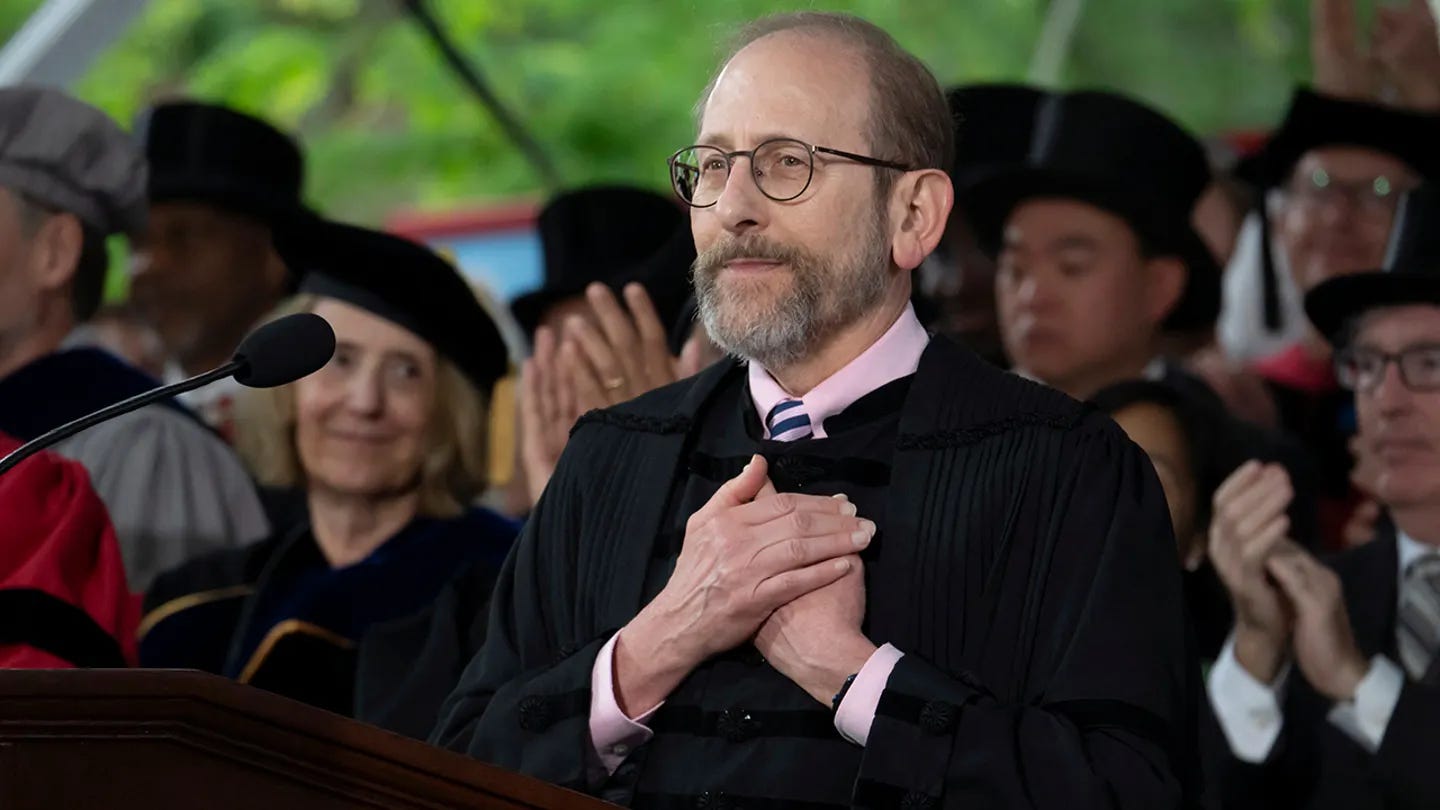Harvard's 374th Commencement
By Richard Y. Rodgers
Since September 1642, when President Henry Dunster conferred degrees on nine candidates, Harvard University has hosted a commencement ceremony. After nearly four centuries, Harvard continues this tradition, now one of “largest and oldest academic ceremonies” on the continent. Thursday morning, graduates and their families filed through the gates of Harvard Yard, as did generations before them, to celebrate the Class of 2025. Unsurprisingly, current events made their way into many of the day's speeches. However, there was a notable lack of protests or demonstrations, and the focus remained, for the most part, on the gravity of the moment.
Gloria White-Hammond, MDiv ’97, the Chaplain of the Day, opened the ceremony with a very special thank you—not to God, but to the Massachusett tribe. She also commented on the “rich tapestry” of the graduating class (a phrase she also used at Harvard College Baccalaureate on Tuesday and a hallmark of AI-generated text).
President Alan Garber ’76, was greeted with a standing ovation by faculty, administrators, and students as he approached the podium. In clear reference to Harvard’s battle with President Donald Trump, he began by welcoming students and guests from “down the street, across the country, and around the world. Around the world—just as it should be.” This, too, was met with standing applause.
Aidan Scully ’25 gave the Latin Salutatory, wherein he offered that “neither powers nor princes can change the truth and deny that diversity is our strength.” That the Romans would have dreamed that their Latin would ever be used to explain diversity as a strength is up in the air.
Thor Reimann ’25 and Yurong “Luanna” Jiang, MPA ’25, gave the English orations. Reimann’s speech, “This World is Not Conclusion,” was opened with the fact that he is an “openly queer” Midwesterner. This personal qualifier, unrelated to Reimann's broader message, was followed by a speech that emphasized the worthiness of “this ongoing project of Veritas.” Jiang spoke on “Our Humanity,” which began with what sounded like the setup for a joke, at first. “There we were, an Indian and a Thai, calling me, a Chinese in Mongolia, to decipher a washer in Tanzania,” she said. “We all studied together—here at Harvard,” she added, to predictable applause. Touching upon the calling she feels to use her Harvard education to address the genuine injustices of the world, the speech took an affective bent. She mentioned children dying in wars and little girls being separated from the dignity of education, and that “a woman anywhere in the world who can’t afford a period pad…makes [Jiang] poorer.”
The conferral of degrees went off essentially without a hitch, save a small crowd of Divinity School students waving Palestinian flags, flapping keffiyehs, and draped in queer stoles.
Harvard also conferred honorary degrees on six people: Kareem Abdul-Jabbar, Richard Alley, Esther Duflo, Elaine Kim, Rita Moreno, and Abraham Verghese. Professor Duflo, of Cambridge’s most illustrious vocational school, MIT, wore a sticker that read, “Without our international students, Harvard isn’t Harvard.” She did not attend and does not work at Harvard, so her opinion of what makes Harvard itself is somewhat foreign. Nevertheless, the moment was rightly overshadowed by a heartfelt exchange between Moreno and Carolyn Hao ’26, with Moreno stepping in to sing the final note of “Somewhere” from West Side Story.
Abraham Verghese, a Stanford physician and author who delivered the commencement address, described his arrival on campus as akin to a medieval messenger sneaking past enemy forces to enter a besieged kingdom. He continued by saying that recent events surrounding the Trump administration's pressure on Harvard should inspire a new appreciation for the rule of law and due process, despite the fact that Harvard itself has lately struggled to uphold those very ideals. He also noted the need to appreciate truth at a time when “the absence of truth has come to feel almost normal,” even as Harvard continues to obscure fundamental truths about human nature, gender, and the origins of life.
Speaking on the importance of reading fiction, Verghese lamented supposed bans on books “that might speak to a young reader” and said he hoped to help return America to the one he read about as a youth.
He then went on to recount his work in rural healthcare and the prevalence of AIDS cases among homosexual men who had left their hometowns, contracted the disease in urban centers, and later returned. He closed with a letter written by one such man to his mother.
The Harvard Commencement Choir and University Band gave a neutered but beautifully performed rendition of “Fair Harvard.”
Matthew Potts, MDiv ’08, PhD ’13, Pusey Minister in the Memorial Church, as was typical throughout the week, ended the proceedings by giving a benediction without once invoking God.
We at The Harvard Salient congratulate the Class of 2025 on their induction into a glorious tradition. Even when that tradition is obscured, misunderstood, or misremembered, it endures. Behind various fashions and obfuscations, the ideal of Veritas remains, inscribed on the gates, the shields, and the hearts of those who still earnestly seek it. We trust that Fair Harvard retains the power to inspire her alumni to reclaim and restore the best of her heritage.
A recording of yesterday’s ceremony is available here.




We can be grateful for small things that should be normal.
No significant political disruptions.
No lurid Jew-hatred from the podium as at MIT.